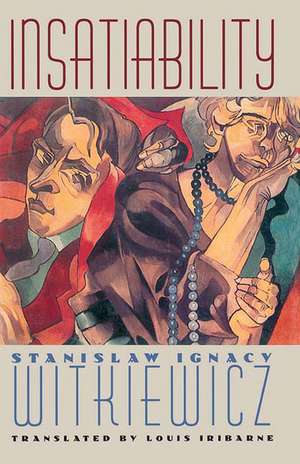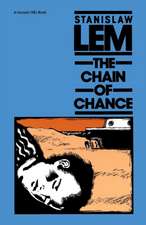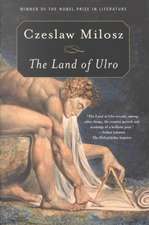Insatiability
Autor Stanislaw Ignacy Witkiewicz Traducere de Louis Iribarneen Limba Engleză Paperback – 30 sep 2012
Witkiewicz's 1927 masterpiece, made famous in Polish dissident and Nobel laureate Czesław Miłosz's The Captive Mind, is one of the most unforgettable depictions of the tensions and trade-offs between ideological loyalty and individual conscience in world literature. Futuristic, experimental, and remarkably prophetic, Insatiability traces the choices of a young Pole as his divided nation both opposes and welcomes a communitarian invasion from the east offering a narcotic that both removes anxieties and induces obedience. An anti-Utopian classic, it foretold the irresoluble and sometimes deadly choices that faced Eastern European thinkers, writers, and politicians during the years of Soviet domination.
Preț: 289.63 lei
Nou
Puncte Express: 434
Preț estimativ în valută:
55.42€ • 57.86$ • 45.87£
55.42€ • 57.86$ • 45.87£
Carte disponibilă
Livrare economică 14-28 martie
Preluare comenzi: 021 569.72.76
Specificații
ISBN-13: 9780810111349
ISBN-10: 0810111349
Pagini: 534
Dimensiuni: 165 x 235 x 36 mm
Greutate: 0.75 kg
Ediția:1
Editura: Northwestern University Press
Colecția Northwestern University Press
ISBN-10: 0810111349
Pagini: 534
Dimensiuni: 165 x 235 x 36 mm
Greutate: 0.75 kg
Ediția:1
Editura: Northwestern University Press
Colecția Northwestern University Press
Notă biografică
STANISLAW IGNACY WITKIEWICZ (1885-1939) was a Polish novelist, poet, and playwright. An ardent nationalist, Witkiewicz killed himself in 1939 upon hearing that the Soviet Army had invaded Poland.
LOUIS IRIBARNE is a professor of Slavic Languages and Literatures at the University of Toronto. He has translated several works by Polish writers such as Gombrowicz, Milosz, and Schulz.
LOUIS IRIBARNE is a professor of Slavic Languages and Literatures at the University of Toronto. He has translated several works by Polish writers such as Gombrowicz, Milosz, and Schulz.
Cuprins
Part One: The Awakening
The Awakening
Soirée at the Princess di Ticonderoga's
A Visit with Tenzer
A Visit to Prince Basil's Retreat
Sexphyxiation
The Return, or Life and Death
Demonism
Domestic Affairs and Destiny
Part Two: Insanity
School
A Meeting and Its Consequences
A Repeat Performance
A Commander's Thoughts and the Little Theater of Quintofron Crepuscolo
Torchures and the Debut of the "Gent from Below"
A Battle and Its Consequences
The Final Metamorphosis
The Wedding Night
The Last Convulsion
Notes
The Awakening
Soirée at the Princess di Ticonderoga's
A Visit with Tenzer
A Visit to Prince Basil's Retreat
Sexphyxiation
The Return, or Life and Death
Demonism
Domestic Affairs and Destiny
Part Two: Insanity
School
A Meeting and Its Consequences
A Repeat Performance
A Commander's Thoughts and the Little Theater of Quintofron Crepuscolo
Torchures and the Debut of the "Gent from Below"
A Battle and Its Consequences
The Final Metamorphosis
The Wedding Night
The Last Convulsion
Notes
Recenzii
"Magnificent." —Susan Sontag
"One of the key works of European literary modernism . . . an exhilarating amalgam of Swiftian satire, Dostoyevskian intensity, and (an acknowledged influence) Rabelaisian digressiveness. And one of the most exciting novels of its time." —Kirkus Reviews
"The translation is brilliant, smoothly finding perfect phrases and puns." —Publishers Weekly
"The translation is brilliant, smoothly finding perfect phrases and puns." —Publishers Weekly
"There were three of us; Witkiewicz, Bruno Schulz, and myself—he three muskateers of the Polish avant-garde between the wars. Only Witkiewicz remains to be discovered." —Witold Gombrowicz
Descriere
This novel, the author's masterpiece, is one of the greatest expressions ever of the tortured intersection of political and personal destinies in Eastern Europe. Futuristic, experimental, and remarkably prophetic, Insatiability traces the adventures of a young Pole whose fate parallels the collapse of Western civilization following a Chinese communist invasion from the east. Written in 1927, Witkiewicz's anti-Utopian novel proved to be a horribly prescient vision of what would become reality for Eastern Europe in the late 1930s.







